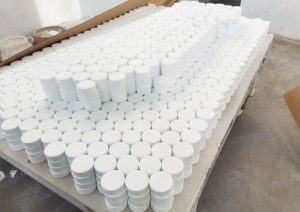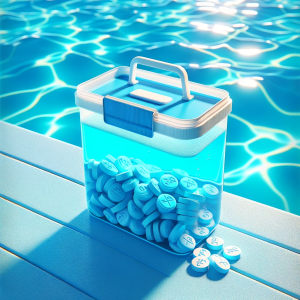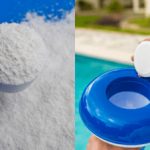The management of pool water quality is crucial for ensuring the health of swimmers and providing a conducive swimming environment. In this regard, the use of chlorine tablets is one of the widely adopted methods. With a high chlorine content, chlorine tablets effectively eliminate bacteria and microorganisms, maintaining water clarity and transparency. So, what are the benefits of using chlorine tablets in a pool?

I. Sterilization and Disinfection:
- High-Concentration Chlorine Effect: Chlorine tablets contain compounds with a high concentration of chlorine, primarily in the form of chloride ions (Cl-), which rapidly release efficient chlorine into the water. Chlorine, as a potent oxidizing agent, has a sterilizing effect on microorganisms in the water.
- Sterilization Effect: When chlorine tablets dissolve in water, chloride ions react quickly with bacteria, viruses, and other microorganisms in the water, disrupting their cell structures and metabolic functions. This action leads to the death of microorganisms, achieving the desired sterilization and disinfection effects.
- Broad-Spectrum Elimination: The sterilizing environment formed by high-concentration chlorine in the pool water is broad-spectrum, effectively eliminating various bacteria, viruses, and other microorganisms, including common pathogens.
- Water Quality and Hygiene Assurance: Chlorine’s sterilizing action helps the pool water maintain a high level of hygiene. This is crucial for preventing the spread of diseases in the water and protecting the health of swimmers.
- Prevention of Pool Odor: The sterilizing effect of chlorine tablets also helps prevent the development of odors in the pool, such as those caused by algae growth. By eliminating microorganisms, chlorine tablets contribute to keeping the water fresh.
- Rapid Response: Due to the high concentration of chlorine, chlorine tablets quickly exert their sterilizing effects upon application, leading to rapid improvement in pool water quality.

II. Prevention of Algae Growth:
- Inhibition of Algae Growth: Chlorine-containing tablets have properties that inhibit the growth of algae. Algae, common aquatic plants, can proliferate in water, sometimes causing the water to turn green and cloudy, affecting the pool’s transparency.
- Chlorine’s Anti-Algae Mechanism: Chlorine possesses oxidative and disinfectant properties, providing a certain inhibitory effect on algae. When chlorine is released into the pool water from chlorine tablets, it can disrupt the cell structures of algae, impeding their normal growth and reproductive processes.
- Prevention of Green Water: Algae typically cause water to turn green, signaling poor water quality. The use of chlorine tablets effectively prevents excessive algae growth, maintaining clear and transparent water.
- Maintaining Clean Water Quality: By preventing algae growth, chlorine tablets contribute to maintaining the cleanliness and hygiene of pool water. Clear and transparent water not only enhances the swimming experience but also reduces maintenance work associated with water quality issues.
- Prevention of Water Turbidity: Excessive algae proliferation can lead to water turbidity, affecting water transparency. The anti-algae effect of chlorine tablets helps prevent this undesirable phenomenon, preserving the clarity of pool water.
III. Prolonged Release:
- Slow Release Mechanism: Chlorine tablets are designed for slow dissolution, achieving a prolonged release effect. This feature is crucial for pool water treatment. Chlorine gradually releases in the water, maintaining chlorine concentration within a relatively stable range, contributing to the stability of water quality.
- Stable Chlorine Concentration: The effect of prolonged release ensures that the chlorine concentration in the water remains within a long-term effective range. This is essential for maintaining water hygiene, preventing bacterial and viral proliferation, and keeping the pool water consistently disinfected.
- Long-Lasting Disinfection Effect: Prolonged release from chlorine tablets ensures that the pool benefits from the disinfection effects of chlorine over an extended period, eliminating the need for frequent additions or monitoring. This reduces the complexity of pool management, providing greater convenience for administrators.
IV. Easy and Convenient to Use:
- Simple Application: The use of chlorine tablets is relatively simple, providing convenience for pool maintenance personnel. Simply placing the tablet into a dedicated dispenser or the pool itself is all that is required, eliminating the need for complex operations. This simplicity accommodates pool managers with varying levels of experience.
- No Additional Equipment Needed: The design of chlorine tablets eliminates the need for additional equipment required in some traditional pool disinfection methods, such as liquid chlorine dispensing systems. This simplifies the management process, reducing the workload for administrators.
- Strong Portability: Chlorine tablets typically exist in a small, lightweight form, making them easy to carry and store. This enhances convenience for administrators during application, as they do not need to carry large disinfectant containers.
- Compatibility with Automated Dispensing Systems: For advanced pool systems, chlorine tablets can be compatible with automated dispensing systems, enabling more intelligent and automated water treatment. This enhances overall management efficiency.
V. Wide Applicability and Cost-Effectiveness:
- Public Pools: Chlorine tablets are suitable for large public pools, such as water parks and fitness centers. Their prolonged release and ease of use make them efficient for managing large-scale pools.
- Private Pools: Whether for home, hotel, or private estate pools, chlorine tablets are an ideal choice. Managers can easily maintain water quality by using chlorine tablets without the need for overly complex equipment and operations.
- Low Cost: Compared to other pool disinfection methods, chlorine tablets are relatively cost-effective. This allows for efficient water quality management even with limited economic budgets.
- Long-Term Maintenance: The prolonged release mechanism of chlorine tablets allows them to maintain the hygienic state of the water for an extended period, reducing the need for frequent applications. This lowers consumption costs, providing long-term economic efficiency for administrators.
- Reduced Labor Costs: The easy-to-use nature of chlorine tablets alleviates the operational burden on administrators, reducing labor costs. Minimal technical training is required, allowing for the easy completion of water quality management tasks.
- Cost-Effective Choice: Combining low costs with long-term maintenance characteristics, chlorine tablets emerge as a cost-effective choice suitable for various pool sizes and types.
In conclusion, using chlorine tablets in a pool not only effectively maintains water clarity but also provides sterilization, prevents algae growth, and offers convenience. By selecting the appropriate chlorine tablets and following the correct usage methods, a pool can offer a safe and healthy swimming environment for enthusiasts.




